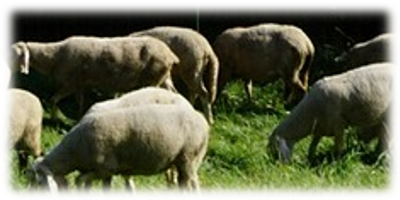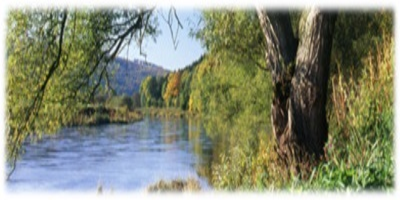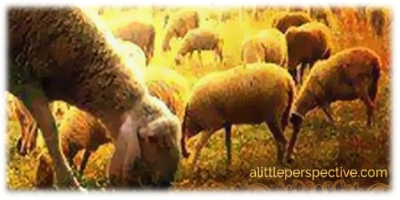Verse 1
The LORD is my shepherd, I shall not want; (RSV)
LORD: The word LORD (Strong's #3068), when written in all upper-case letters, is the Hebrew name יהוה, which is often transliterated as Yahweh or Jehovah.
Shepherd: The Hebrew word for shepherd is the verb ra'ah (Strong's #7462) meaning to "feed" and "tend the flock," which are the responsibilities of a shepherd; but the shepherd is also a friend to the flock. Note that the translation uses the noun "shepherd" to translate this verb; this is an indication that this verb is written as a participle, a way of changing a Hebrew verb into a noun.
Want: This is the verb chaser (Strong's #2637), which means to be lacking in something that will cause failure.
Literal Translation: Yahweh is my shepherd and I will not be lacking in anything.
Expanded Translation: Yahweh is my friend who feeds me and takes care of me and I will not be lacking in anything and I will succeed.
Summary of verse 1: Yahweh is being compared to a shepherd. In Ancient Israel the shepherd would spend a great deal of his time with his flock and often times many days away from the family camp. The flock, be they sheep or goats, would be his companions and the shepherd would be their protector and provider. King David, the author of this Psalm, was in his youth a shepherd and he would be intimately familiar with the role of a shepherd.
Verse 2
he makes me lie down in green pastures. He leads me beside still waters; (RSV)
Lie down: The verb rabats (Strong's #7257) imply the crouched resting position of a sheep or other animal that is in a state of relaxation and implies no fear of predators or starvation.
Green: The word deshe (Strong's #1877) is the green grasses that spring up from the soil, the food staple of the flock.
Pastures: The noun na'ah (Strong's #4999) is the pasture or habitation of the flock, but figuratively used for a home.
Lead: The verb nahal (Strong's #5095) means to gently and carefully lead another and provide protection and sustenance.
Beside: The Hebrew word al (Strong's #5921) is frequently used as a preposition meaning "upon" or to be "over" something.
Still: The noun menuchah (Strong's #4496) means "a quiet place of rest" and is derived from Strong's number 5117, a verb meaning to "settle down to rest."
Waters: The Hebrew word mayim (Strong's #4325) is a plural noun literally meaning waters.
Literal Translation: I will lie down in green pastures. He will lead me over to still waters.
xpanded Translation: I will lie down to rest in a pleasant and beautiful home that is filled with fresh food from the soil. He will protect and sustain me as he gently leads me over to a quiet restful place by the water.
Summary of verse 2: The role of the shepherd is to guide the flock to food and water and to protect them from any predators or thieves that may be about. In this same way Yahweh will provide food and water to his people and protect them from their enemies. King David, the author of this Psalm, would be intimately familiar with the roles and responsibilities of a shepherd as he was one in his youth.
Verse 3
he restores my soul. He leads me in paths of righteousness for his name's sake. (RSV)
Restore: The verb shub (Strong's #7725) can mean to turn, return or retreat, in the sense of going back to somewhere you have been before.
Soul: The word nephesh (Strong's #5315) is used in a wide variety of applications, but has the general idea of "breath;" it is derived from 5314, which is a verb that means to breathe and to be refreshed, maybe in the sense of getting your breath back after being winded, or maybe sitting in a fresh breeze when hot and tired; in both cases one is refreshed.
Lead: The word nachah (Strong's #5148) is a different verb from the one used in the previous verse that can also mean to lead; this verb more means to guide someone to an unfamiliar place.
Path: The noun magal (Strong's #4570) means a "track" as a visible sign that others have passed down a path and is derived from 5696, which means to revolve or round; the connection between "revolve" and "track" may be the revolving wheels wagons that create tracks in the path.
Righteousness: The noun tsedeq (Strong's #6664) means "correct" and "right" and is derived from a verb meaning "to be right;" naturally, as in the correct path; morally, as in the correct actions; and legally, as in following the rules and laws of the tribe or nation
Name: The word shem (Strong's #8034) means "name," but is often times used in the sense of a person's fame or reputation.
Sake: The word ma'an (Strong's #4616) is an adverb meaning "on account of" or "in order that," and comes from a root meaning "to pay attention."
Literal Translation: He will return my breath; he will guide me in the paths of correction because of his name.
Expanded Translation: He will return my breath to me and I will be restored. He will guide me down the well-worn paths in the correct direction because this is his character and reputation.
Summary of verse 3: Just as the shepherd leads his flock to fresh green pastures to provide them with ample sustenance, so will YHWH lead us to a beautiful place of restoration.
Verse 4
Even though I walk through the valley of the shadow of death, I fear no evil; for thou art with me; thy rod and thy staff, they comfort me. (RSV)
Even: The word gam (Strong's #1571) is an adverb meaning "also," in the sense of repeating something and comes from an unused root meaning to gather, in the sense of bringing together different thoughts.
Walk: The word halakh (Strong's #1980) means to walk, march or travel.
Valley: The word gay (Strong's #1516) appears to be more than just a valley, but a deep narrow gorge, a place that is dark and frightening and there is only two ways to go, back from where you came or to continue on, but there is no exit; the verb that this word comes from means "arrogance" and "pride," a person who puts up high walls around himself, shutting himself off from the outside world, just like a gorge.
Shadow of death: The word tsalmavet (Strong's #6757) is a combination of two words, 6738 meaning shade or shadow and 4194 meaning death or the dead; on a side note, the Hebrew for this word is tsal'mavet, two words combined to make one word; Hebrew never does this, except for in names and therefore, I believe this to be a gorge which bears the name tsal'mavet.
No: The word lo (Strong's #3808) is the particle that negates the action of the verb.
Fear: The verb yare (Strong's #3372) means to "fear."
Evil: The noun ra (Strong's #7451) means "bad" and is often used in contrast with "good."
For: The word kiy (Strong's #3588) is a particle that can be translated many different ways depending on the context
You: This word atah (Strong's #859) is the second person, masculine, singular pronoun
With: The word immad (Strong's #5978) is a preposition that means to be equally with another, or to be beside them
Rod: The noun shebet (Strong's #7626) is a branch, stick or rod that is used to discipline and is a parallel with the next word.
taff: The noun meshenah (Strong's #4938) is a stick, branch or rod, but is closely related to other words that mean support, the function of a walking stick.
They: The word hem (Strong's #1992) is the third person, plural pronoun.
Comfort: The verb nacham (Strong's #5162) means to be have comfort and consolation.
Literal Translation: In addition, when I travel in the gorge of the shadow of the dead, I will not be afraid of bad things, because you are beside me, your staff and stick, they give me relief and I am consoled,
Expanded Translation: In addition to all of this when I travel through a deep dark narrow gorge covered in the shadow of the dead, I will not be afraid of the bad things because you are beside me, your staff of correction and your walking stick of support, they give me a sigh of relief and I am consoled
Summary of verse 4: One of the shepherd's most important tools was his staff. He used it to guide a member of the flock as well as use it as a weapon to defend the flock. In the Ancient Hebrew mind, the staff was also a symbol of authoritiy.
Verse 5
Thou preparest a table before me in the presence of my enemies; thou anointest my head with oil, my cup overflows. (RSV)
Prepare: The word arak (Strong's #6186) has the fuller meaning of arranging something according to Strong's definition of this verb.
Table: The noun shulchan (Strong's #7979) is literally a table, but implies a meal on the table and comes from the verb 7760, which has a meaning of spreading out.
Before: This Hebrew noun paniym (Strong's #6440) literally means the "face;" the dictionary states that when this noun is prefixed with a preposition it means "before;" on a side note, the Hebrew word in this text is le'pha'nai, a common Biblical word literally meaning "to the face of..."
Presence: The noun neged (Strong's #5048) means "in front," and comes from the root 5046 which means to stand out boldly.
Enemy: The verb tsarar (Strong's #6887) literally means to be "cramped up" as in being confined in a narrow pressing place; the KJV is again using a noun, enemy, for this verb, implying that the Hebrew verb is written in the participle form.
Anoint: According to Strong's the verb dashen (Strong's #1878) means to "be fat," but can also mean to "anoint" in the sense of putting fat on someone's head; on a side note, while we cannot get more out of this word from Strong's, other resources, which we will look at in a future lesson, can help shed some light on the meaning of this verb.
Head: The noun rosh (Strong's #7218) means head.
Oil: The literal meaning of the noun shemen (Strong's #8081) is "oil," but if you look up the uses of this word in other verses it is clear that this word is often used for olive oil
Cup: The noun kos (Strong's #3562) is literally a cup used to hold liquids, but is closely related to 3599, which a cup or bag of money; it can be implied that a cup is a concrete word used for one's holdings or possessions and context of the passage does imply this.
Overflow: The noun revayah (Strong's #7310) means to "overflowing with wealth" and comes from 7301 meaning to fill and satisfy.
Literal Translation: You will arrange a table in front of my face, showing this in front of my enemy that is pressing in on me: you will anoint my head with oil, all my possessions will overflow.
Expanded Translation: You will put in order and arrange a meal spread out on the table in front of my face, boldly showing this in front of my enemy that is pressing in on me: you will anoint my head with perfumed olive oil, all of my holdings and possessions will abundantly overflow to fill my needs.
Summary of verse 5: The idea that I see here is that YHWH will provide everything that his follower needs and this will be displayed in front of his enemies to cause them jealousy. The enemy will realize that he has no hold over him and is unable to conquer him.
Verse 6
Surely goodness and mercy shall follow me all the days of my life; and I shall dwell in the house of the LORD for ever. (RSV)
Surely: The particle ak (Strong's #389) and its root imply something of a surety and firmly established.
Goodness: The noun tob (Strong's #2896) is used in a wide variety of ways, but in the context of this verse it implies the ideas of pleasure, beautiful, bountiful and cheerfulness, all of which Strong's identifies as possible meanings of this noun.
Mercy: The noun chesed (Strong's #2617) means kindness and comes from 2616, a verb concretely meaning to bow the head as a sign of kindness.
Follow: The verb radaph (Strong's #7291) means to "chase after."
All: The word kol (Strong's #3117) means "all."
Days: The literal meaning of the noun yom (Strong's #3117) is day.
Life: The noun chay (Strong's #2416) means "life."
Dwell: The verb yashab (Strong's #3427) means to "sit," but often in the context of remaining or returning to one's home or another specific place to settle down.
House: The literal meaning of the noun bayith (Strong's #1004) is "house," but can also be a large house, a palace, or temple "house or palace of God.
LORD: The word LORD (Strong's #3068), when written in all upper-case letters, is the Hebrew name יהוה, which is often transliterated as Yahweh or Jehovah.
For ever: The word "forever" is a translation of two Hebrew words. The word orek (Strong's #753) means "long" and the word yom (Strong's #3117) means "day."
Literal Translation: It is a sure thing that goodness and kindness will chase after me all the days of my life: I will settle in the house of YHWH for a long number of days.
Expanded Translation: It is a sure thing that bountiful and beautiful things and kindness will chase after me all the days of my life: I will remain and settle down in the palace of Yahweh a very long number of days.
Summary of verse 6: Yahweh will not let his followers down. As long as Yahweh is their shepherd, he will always provide for them and take care of them. He will provide shelter and comfortable place to live.
Additional Notes:
For the Poetical aspect of this chapter, see The Poetry of Psalm 23.

Like what you’re discovering? Continue the journey from Bible reader to translator.
|






